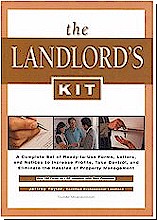Title: Eviction Explained Author: Adam Smith Article: Have you ever been evicted? If you have, then you are probably all too familiar with the eviction process and the rights that both the tenant and the landlord retain throughout the eviction process. Both the landlord as well as the tenant should have some working knowledge concerning when an eviction can be performed before signing a binding <a href=http://articlealley.com/article_36169_15.html> lease agreement </a>. You may be surprised to learn there are a couple of different kinds of evictions. Typically, when somebody hears that a landlord has evicted a tenant it is assumed the tenant was late on their payments. Though this conception - that an <a href=http://www.oneminutemillionaire.com/affiliate/glossary/evict ion.asp> eviction </a> only occurs when there is a problem with the tenant - is probably true the majority of the time, sometimes there are other reasons for an eviction. These different kinds of evictions are often known as an eviction without cause, just cause eviction, and a constructive eviction. Let's examine the differences between the two. <b>Just Cause Eviction</b> - A just cause eviction is exactly what you would expect, an eviction that occurs with a just cause, or good reason. In areas that regulations only allow for just cause evictions, the landlord must have reason that will stand up in court in order to evict the tenant. For instance, if the tenant has not paid rent then that would offer just cause to the tenant to begin the eviction proceedings. Another just cause for <a href=http://articlebin.com/view_article.php?article=15753> eviction </a> includes occasions where the tenant has substantially damaged the property. <b>Eviction without Cause</b> - Many cities and counties allow landlords to evict tenants without cause. In this case, a tenant cannot be evicted if they are still under contract and there is no just cause. However, once the lease agreement has expired the landlord can evict the tenant without cause. <b>Constructive Eviction</b> - This type of <a href=http://www.articleblast.com/Business_and_Management/Entrepre neurialism/The_Art_of_Eviction_200510192019/> eviction </a> is not all that common. In this scenario, a tenant is in effect "evicted" or compelled to leave because the landlord has allowed the conditions of the property lapse severely. In other words a constructive eviction occurs when the living conditions of the property have become unbearable and the tenant is compelled to move. Tenants who have experienced this sort of eviction have many options of legal recourse open to them. Understanding the various types of evictions helps clear up any preconceived notions people might have regarding tenants who are evicted. As we have learned not all evictions occur because of deadbeat tenants. In fact, in the case of the constructive eviction the tenant is actually the victim. When a just cause eviction does occur, there are typically legal guidelines that must be followed to ensure the eviction is performed in a professional and legal manner. The appropriate documents must be filed with the court, and before any eviction can occur the court must approve the eviction with a court order. Or course, before any court ordered eviction is issued, the eviction court must examine all the evidence and decide whether an eviction is warranted. If an eviction is warranted, then the tenant will be given certain amount of time to remove his property from the premises. Should the tenant fail to comply with this order, law enforcement may become involved as the landlord reassumes possession of the property. Hopefully you will never have to go through the eviction process, whether it be a just cause eviction or a constructive eviction. However, knowing the guidelines around the eviction process can help you considerably in protecting your rights. <b><i>Adam Smith</b></i> is an internet marketer for 10X Marketing, a firm specializing in <a href=http://www.10xmarketing.com/Services/Affiliate-Programs/Affi liate-Program-Management.html> affiliate program management</a>. For more rental property information, including the details of a <a href=http://www.oneminutemillionaire.com/affiliate/glossary/lease -agreement.asp> lease agreement </a> please visit OneMinuteMillionaire.com About the author: None
|
